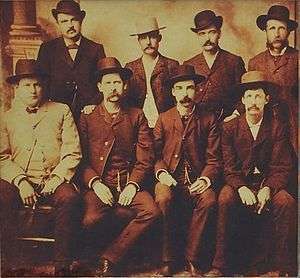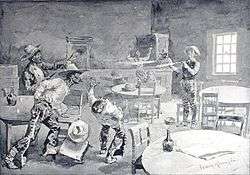Dodge City War
|
The "Dodge City Peace Commission" June 10, 1883. Standing (L-R): William H. Harris (1845–1895), Luke Short (1854–1893), William "Bat" Masterson (1853–1921), William. F. Petillon (1846–1917). Sitting (L-R): Charlie Bassett (1847–1896), Wyatt Earp (1848–1929), Michael Francis "Frank" McLean (1854–1902), Cornelius "Neil" Brown (1844–1926). Photo by Charles Conkling.[1] | |
| Date | June, 1883 |
|---|---|
| Location | Dodge City, Kansas, USA |
| Outcome | Long Branch Saloon reopened |
| Deaths | None |
The Dodge City War was a bloodless conflict that took place between Luke Short and the Dodge City mayor, who tried to force Short to close the Long Branch Saloon and leave town. Luke called on several long-term friends including Wyatt Earp and others who supported him during his confrontation from April 28 to June 7, 1883. The event is best remembered because it produced one of the most iconic photos of Western gamblers and gunfighters who played roles in the history of the Wild West.
Luke Short and the Long Branch Saloon
Luke Short arrived in Dodge City during April 1881. William H. Harris, whom Short had met in Tombstone a few months earlier, gave Luke a job as a faro dealer at the Long Branch Saloon in Dodge City, Kansas. The saloon was owned by Harris and his partner Chalk Beeson. On February 6, 1883, Chalk Beeson sold his interest in the Long Branch to Short.[2][3]
The month after Short and Harris formed their partnership, Harris was nominated to run for Dodge City mayor. On March 19, 1883 a law and order group nominated Lawrence E. Deger to run against Harris. Deger defeated Harris by a vote of 214 to 143 on April 3. The citizens also elected all five of the city council candidates running with Deger.[4] On April 23 the Dodge City Council passed two ordinances that were immediately approved by Mayor Deger. "Ordinance No. 70" was for "The Suppression of Vice and Immorality within the City of Dodge City," while "Ordinance No. 71" was used to "Define and Punish Vagrancy." Both of these ordinances were aimed at the Long Branch Saloon. On April 28, 1883 three prostitutes employed at the Long Branch were arrested by City Marshal Jack Bridges and policeman Louis C. Hartman. Soon afterward Short and Hartman exchanged gunfire. Neither man was hurt. Short was quickly arrested and released on $2,000 bond. His preliminary examination was set for May 2.[5]
Luke Short forced out of Dodge
On April 30 Luke Short was again arrested (along with five other gamblers) and placed in jail.The following day Short and the five others were escorted to the train depot and given their choice of east or west-bound trains.[6] Short went east to Kansas City, Missouri where he looked up Charles E. Bassett at the Marble Hall Saloon.Bassett and Luke had a lot in common, not the least of which was that they both, at different times, owned an interest in the Long Branch Saloon. Bassett had served as the first sheriff of Ford County, as well as city marshal of Dodge City. Both Wyatt Earp and Bat Masterson had, at various times, served under Bassett as deputies. Together, Short and Bassett, along with William F. Petillon, began laying the groundwork for Luke's reinstatement in Dodge. Luke went to Topeka on May 10, where he presented a petition to Governor George W. Glick. Short then returned to Kansas City where he was joined by Bat Masterson. Things started to heat up when Wyatt Earp arrived in Dodge City, along with several gunfighters, on May 31. Short, Earp and Petillon met in Kinsley, Kansas on June 3, 1883 and took the afternoon train to Dodge City. Mayor Deger issued a proclamation the following day ordering the closing of all gambling places in Dodge City.[7]
Dodge City Peace Commission
Mayor Deger's action came during the cattle season and promised ruin for the cowtown's seasonal boom. So it was that economics - rather than bloodshed - resolved the "Dodge City War." Additional pressure to resolve the issue had come from Governor Glick, as well as the Santa Fe Railroad, which did considerable business in Dodge. The gambling halls, dance halls and saloons were then ordered reopened - including the Long Branch. On June 9 both sides met in a dance hall that opened that night and resolved their differences. The following day - June 10, 1883 - eight men gathered and posed for what has become one of the most reproduced Wild West history photos. The group was immediately dubbed the "Dodge City Peace Commission." The eight men in the historic photo were: William H. Harris, Luke Short, Bat Masterson, William F. Petillon, Charles E. Bassett, Wyatt Earp, Michael Francis "Frank" McLean and Cornelius "Neil" Brown. Immediately after the photo was taken, Bat Masterson and Wyatt Earp departed on a west bound train for Colorado.[8]
The Long Branch Saloon had reopened and the bloodless "Dodge City War" had ended - but Luke Short had decided the time had come to leave Dodge on his own terms. On November 19, 1883 Short and Harris sold the Long Branch to Roy Drake and Frank Warren.[9] Short then moved to San Antonio for a brief time, before deciding to relocate in Fort Worth.[10]
References
- ↑ Dodge City Peace Commission Old West Gunfighters Dodge City, KS 1883 (1883) Ford County Historical Society. retrieved October 2014
- ↑ Ford County Globe (Dodge City), February 6, 1883
- ↑ Demattos, Jack; Parsons, Chuck (July 21, 2015). "The Man Behind the Dodge City War". True West. Retrieved 7 October 2015.
- ↑ Dodge City Times, April 5, 1883
- ↑ Ford County Globe (Dodge City), May 1, 1883
- ↑ Dodge City Times, May 3, 1883
- ↑ Leavenworth Times, June 5, 1883
- ↑ Dodge City Times, June 14, 1883
- ↑ Ford County Globe (Dodge City), November 20, 1883
- ↑ Ford County Globe (Dodge City), January 1, 1884.
Further reading
- DeMattos, Jack "The Dodge City Peace Commission Revealed," Wild West History Association Journal (Vol. VI, No. 2), April 2013.
- DeMattos, Jack and Parsons, Chuck. The Notorious Luke Short: Sporting Man of the Wild West, Denton, TX: University of North Texas Press, 2015. ISBN 978-1-57441 594-0
- Shillingberg, Wm. B. Dodge City: The Early Years, 1872-1886, Norman, OK: The Arthur H. Clark Company, 2009. ISBN 978-0-87062-378-3
External links
- The Dodge City War by P.A. Mallory
- Dodge City Peace Commission
- Dodge City Peace Commission June 1883. Original photograph, Ford County Historical Society
- Series of Photographs

